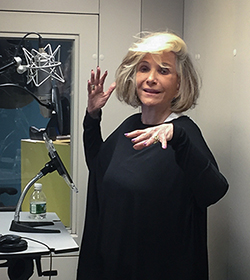 When I finally finished writing my collection of essays and poetry, You Don’t Look Your Age . . . and Other Fairy Tales, I realized there would be an audio version, and it would have to be read. But the thought of reading my own book, admitting my own stories, telling my secrets, was more than I could handle.
When I finally finished writing my collection of essays and poetry, You Don’t Look Your Age . . . and Other Fairy Tales, I realized there would be an audio version, and it would have to be read. But the thought of reading my own book, admitting my own stories, telling my secrets, was more than I could handle.
I discussed this problem ferociously with my friends and even let my psychiatrist in. The conclusion was that rather than keeping the audiobook so close to myself, I should ask others to read it. So who were these others to be and where would I find them?
It all started at the 80th birthday party for playwright and gay rights hero Larry Kramer. The party was in my home, and actress Christine Baranski came to celebrate this great man. A flash occurred! Why not read a poem from the book to Larry (“The Larry Kramer”) and see if he liked it, and at the same time, ensnare Christine into reading it for the audio? “What a good idea,” I thought. “How terrifying!”
At first, I read parts of the poem to Larry’s husband, David Webster: “I loved that he fought to get healthy, defying odds once again. I will not die, he seemed to say, I will not be forgotten, he seemed to say. Yet death hovered and he was challenged. . . .” David teared up and said it seemed fine and that I should give the whole poem to Larry to read. I saw Larry quietly seated, eating his birthday cake alone. I walked over to him, gave him a big kiss and handed him the entire poem. He read it and sweetly smiled. He said that he liked what I had written, that he was flattered. I kissed him again. I then took another deep breath and got the courage to find the beautiful Christine. She loves Larry as I do. I asked her if she would read my poem about Larry for the audiobook. She said of course she would! And then a bell went off in my head. If the likes of Larry liked my poem, and the likes of Christine would read my poem, maybe I could get other celebrities to read my stories. This would distance the book from me, give me a role as Madame Le Directeur, and hopefully be something special to present.
“I never called an agent, I never called a manager. I went direct. And one by one, almost all said yes.”
And so it began, this long journey seeking stardom. Why not the great Rosie O’Donnell, why not the revered gossip columnist Liz Smith, why not the authentic Alan Alda, why not the actress of all actresses, Ellen Burstyn? Why not even dare to ask Meryl Streep? And so I did—by email, by phone, by letter—ask these luminaries to be part of my first book and tell a part of my written and imaginary life. I never called an agent, I never called a manager. I went direct. And one by one, almost all said yes. And one by one, I recorded, nervously directed and always felt grateful as these special folk gave life to my musings.
This is how it came to be, this audiobook narrated by 25 stars, including: Bob Balaban, Kathy Bates, Glenn Close, Katie Couric, Blythe Danner, Lena Dunham, Edie Falco, Tovah Feldshuh, Diane von Furstenberg, Whoopi Goldberg, Gayle King, Diane Lane, Sandra Lee, Judith Light, Jenna Lyons, Audra McDonald, Janet Mock, RuPaul, Lesley Stahl, Martha Stewart, Marlo Thomas, Lily Tomlin, Gloria Steinem and Gloria Vanderbilt.
I hope this performance audio gives life to the book. I hope this feels like a theatrical presentation of the spoken word, with original music by the genius Michael Bacon and the audio perked to perfection by Scott Sherratt and my colleague Rob Forlenza. I present my orchestrated audiobook. Here it is! Voila!
The president of HBO Documentary Films, Sheila Nevins has produced more than a thousand documentaries, many of which have been honored with Academy Awards, Emmy Awards and Peabody Awards. Her wry and poignant autobiographical collection, You Don’t Look Your Age . . . and Other Fairy Tales, charts her course from Barnard College to Hollywood with candid reflections on face-lifts, frenemies and many other topics.
This article was originally published in the June 2017 issue of BookPage. Download the entire issue for the Kindle or Nook.














 When I finally finished writing my collection of essays and poetry, You Don’t Look Your Age . . . and Other Fairy Tales, I realized there would be an audio version, and it would have to be read. But the thought of reading my own book, admitting my own stories, telling my secrets, was more than I could handle.
When I finally finished writing my collection of essays and poetry, You Don’t Look Your Age . . . and Other Fairy Tales, I realized there would be an audio version, and it would have to be read. But the thought of reading my own book, admitting my own stories, telling my secrets, was more than I could handle.











